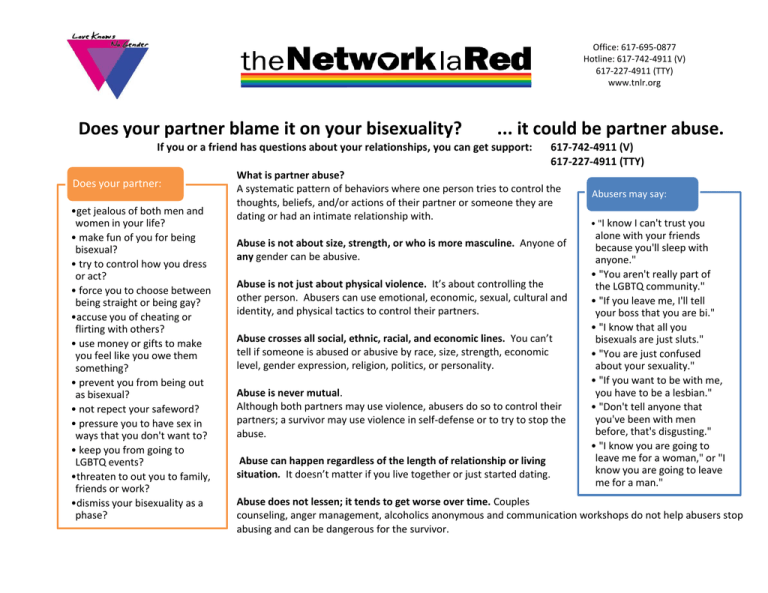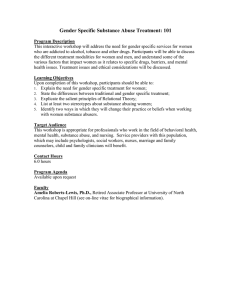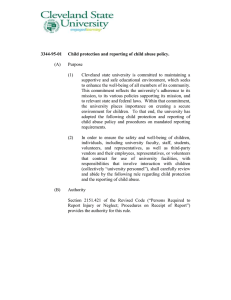
Office: 617-695-0877
Hotline: 617-742-4911 (V)
617-227-4911 (TTY)
www.tnlr.org
Does your partner blame it on your bisexuality?
... it could be partner abuse.
If you or a friend has questions about your relationships, you can get support:
Does your partner:
•get jealous of both men and
women in your life?
• make fun of you for being
bisexual?
• try to control how you dress
or act?
• force you to choose between
being straight or being gay?
•accuse you of cheating or
flirting with others?
• use money or gifts to make
you feel like you owe them
something?
• prevent you from being out
as bisexual?
• not repect your safeword?
• pressure you to have sex in
ways that you don't want to?
• keep you from going to
LGBTQ events?
•threaten to out you to family,
friends or work?
•dismiss your bisexuality as a
phase?
617-742-4911 (V)
617-227-4911 (TTY)
What is partner abuse?
A systematic pattern of behaviors where one person tries to control the
thoughts, beliefs, and/or actions of their partner or someone they are
dating or had an intimate relationship with.
Abuse is not about size, strength, or who is more masculine. Anyone of
any gender can be abusive.
Abuse is not just about physical violence. It’s about controlling the
other person. Abusers can use emotional, economic, sexual, cultural and
identity, and physical tactics to control their partners.
Abuse crosses all social, ethnic, racial, and economic lines. You can’t
tell if someone is abused or abusive by race, size, strength, economic
level, gender expression, religion, politics, or personality.
Abuse is never mutual.
Although both partners may use violence, abusers do so to control their
partners; a survivor may use violence in self-defense or to try to stop the
abuse.
Abuse can happen regardless of the length of relationship or living
situation. It doesn’t matter if you live together or just started dating.
Abusers may say:
• "I know I can't trust you
alone with your friends
because you'll sleep with
anyone."
• "You aren't really part of
the LGBTQ community."
• "If you leave me, I'll tell
your boss that you are bi."
• "I know that all you
bisexuals are just sluts."
• "You are just confused
about your sexuality."
• "If you want to be with me,
you have to be a lesbian."
• "Don't tell anyone that
you've been with men
before, that's disgusting."
• "I know you are going to
leave me for a woman," or "I
know you are going to leave
me for a man."
Abuse does not lessen; it tends to get worse over time. Couples
counseling, anger management, alcoholics anonymous and communication workshops do not help abusers stop
abusing and can be dangerous for the survivor.
Examples of Tactics of Abuse
Cycle of Abuse:
Emotional Abuse:
Hearts and Flowers This is how the relationship starts. The abuser can be charming,
charismatic, sincere, and sexy.
Tension Building The abuser
starts to use subtle
controlling behaviors like
guilt or blame (or other
examples on the right). You
might feel like you are
walking on eggshells.
Survivors often become aware of
their own behavior and try to do
things to avoid conflict or “not get in trouble.”
hearts
and
flowers
- Telling you that you are crazy
- Blaming everything on you
- Not letting you be alone with friends or family
tension
building
- Controlling what you do
Sexual Abuse:
- Forcing you to have sex when you don't want to
explosive
incident
Explosive Incident Your partner uses a tactic or multiple tactics of abuse to control you
(see examples on the right). At this point you may be ready to leave or start questioning
the relationship.
- Forcing you to recount past sexual experiences
- Posting or sharing nude photos or videos without
your permission
- Spreading sexual rumors about you
Cultural/ Identity Abuse:
- Using racism, classism, anti-semitism, ableism,
homophobia, biphobia, or transphobia against you
Hearts and Flowers Your partner tries to prevent you from leaving by becoming the
same person you fell in love with. They may do nice things for you, buy you flowers, take
you out, etc. or just apologize for the abuse. Your partner may claim, “This will never
happen again” or “I will get help” or blames the abuse on drugs, alcohol, or stress.
Although the abuser seems to be acting nice, they are still trying to control their partner.
You may feel relief that the explosive incident is over and that everything seems to be
okay again but then the tension builds again…
- Threatening to out you
The cycle is often repeated over and over again, more rapidly over time. If this sounds
familiar to you, you can get support. The Network/La Red is an organization that
supports lesbian, gay, bisexual, transgender and queer survivors of partner abuse. Many
of us are LGBTQ and survivors ourselves. We can help you talk through your concerns
and connect you to services that may be helpful to you such as support groups,
restraining orders, or confidential shelter.
- Controlling the money
- Shaming you for being bisexual
- Isolating you from your community
Economic Abuse:
- Getting you fired from your job
- Running up bills in your name
Physical Abuse:
- Hitting, punching, or shoving
- Threating to harm or kill you
You don’t have to leave or even want to leave to get support.
- Taking away your wheelchair, crutches, or hearing
aids




